Iran’s FM Cancels Trip To India Over Anti-Hijab Protest Video
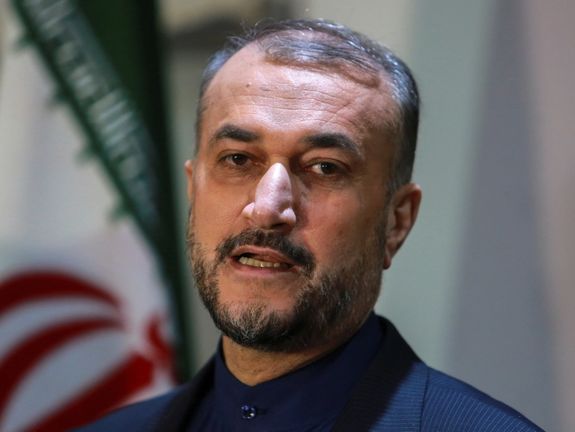
Indian media reported that Iran’s foreign minister has canceled a trip to New Delhi for a conference because a promotional video shows Iranian women cutting their hair.

Indian media reported that Iran’s foreign minister has canceled a trip to New Delhi for a conference because a promotional video shows Iranian women cutting their hair.
The Indian Express wrote on Friday that Hossein Amir-Abdollahian refused to attend the meeting after India ignored Tehran's request to remove two seconds from the video.
The governments of New Delhi and Tehran have yet to react to this report.
In a situation that Tehran has become more isolated by Western countries, this could be a sign that the Iranian regime is also being further sidelined in its relationship with countries that usually it had friendly ties with.
According to Indian Express, the Raisina Dialogue conference will be held in New Delhi in two weeks with the participation of the ministry of foreign affairs of India and the "Observer Research Foundation" thinktank for two days.
The short teaser of the conference includes images of the most important events of 2022.
In the first months of the "Woman, Life, Freedom" protests, many women and girls in Iran cut their hair in the streets, classrooms and on the graves of their dead loved ones in a move to show anger at the clerical ruler’s brutality. Women in other countries also cut their hair in public as a sign of solidarity with Iranian protesters.
Iranian regime has killed over 500 protesters following the death of Mahsa Amini in police custody in September.

A Bloomberg report says Israel has taken the initiative to advance US-sponsored talks with Saudi Arabia and strengthen the "military and intelligence" cooperation between the two countries with the aim of countering "threats" by Iran.
Citing several informed sources, Bloomberg reported Friday that before the recent meeting of the joint working group of the United States and the Gulf Cooperation Council in Riyadh, Saudi and Israeli officials met to assess the areas of cooperation between the two countries.
“Further engagement is expected to take place in Prague to coincide with the Munich Security Conference this weekend,” the sources told Bloomberg.
In recent years, drone attacks on oil tankers in the Persian Gulf, as well as Saudi oil facilities, which have been attributed to Iran and militias supported by the Iranian regime, have fueled concerns about threats from the Islamic Republic.
“We think that other regions integrating and beginning to sit at the same table with Israel is in the interest of stability and security in the region,” US Deputy Assistant Secretary of Defense for the Middle East, Dana Stroul, said in Riyadh on Monday.
The US government and six Persian Gulf Arab states on Thursday jointly called Tehran a growing threat to regional security.
Saudi Arabia cut ties with Iran in 2016 when mobs attacked its embassy in Tehran after Riyadh executed 47 dissidents including the leading Shiite cleric Sheikh Nimr al-Nimr.
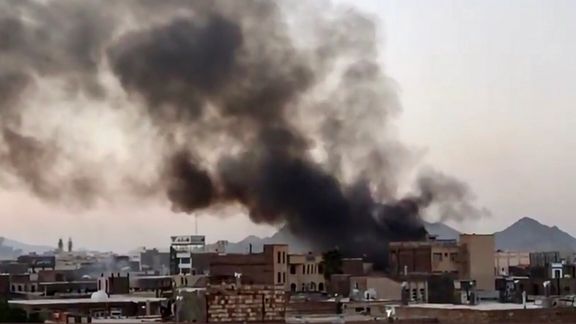
Government media in Iran report that a police commander has been sentenced to 15 months in prison, without mentioning accusations that he raped a teenage girl.
Last year, Sunni Baluch community leaders and people in southeast Iran had accused Ebrahim Kucheckzaei of sexual assault while he was commander of police in Chabahar port city on the Sea of Oman, near Pakistan.
Public anger over the incident contributed to a protest on September 30 in the city of Zahedan when security forces opened fire and killed more than 90 residents. Coupled with anti-regime popular protests, the people of Zahedan have held demonstrations every Friday since the massacre and their religious leader, Mowlana Abdolhamid has become a fierce critic of the Islamic Republic.
Tehran media said that a military court after hearing from “the plaintiff and the family” and examining evidence convicted Kuchakzaei of “some infringements” including actions that discredited the police and filing a false report. They did not mention the alleged sexual assault.
The arrest and conviction of the police commander can be seen as another attempt by the regime to mollify public anger, as five months of protests continue and Western countries impose sanctions on the regime for its human rights violations.
The government has been releasing some political prisoners after a conditional amnesty was announced recently, while still arresting and punishing others for their role in protests or for criticizing the regime.
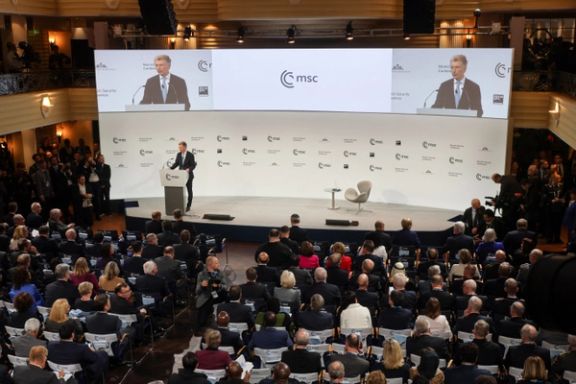
Israel's Defense Minister Yoav Gallant said on Friday that "all possible means" were on the table to prevent Iran from building a nuclear weapon.
He also called on the international community to take action to stop Tehran's proliferation of advanced weapons.
"Iran is currently holding discussions to sell advanced weapons, including UAVs and PGMs, to no less than 50 different countries," he said, referring to combat drones and precision-guided munitions.
Iran has been supplying kamikaze drones to Russia that are used to target Ukraine’s infrastructure. It has also supplied Houthis in Yemen with drone and missile technology, extensively used against Saudi Arabia. Iranian proxy forces such the Hezbollah and Shiite militias in Iraq are also known to have Iranian drones and rockets.
"When we speak of preventing Iran from gaining a nuclear weapon, we must keep all the possible means – I repeat, all possible means on the table," he said, speaking on the sidelines of the Munich Security Conference attended by officials from Bahrain and the United Arab Emirates.
The US and the Arab states comprising the Gulf Cooperation Council (GCC) also held a meeting of the Working Group on Iran this week during the visit of an American delegation to Saudi Arabia and issued a joint statement on Thursday, February 16.
“The United States and GCC member states condemned Iran’s continued destabilizing policies, including its support for terrorism and the use of advanced missiles, cyber weapons, and Unmanned Aircraft Systems (UAS) and their proliferation in the region and around the world,” the statement said.
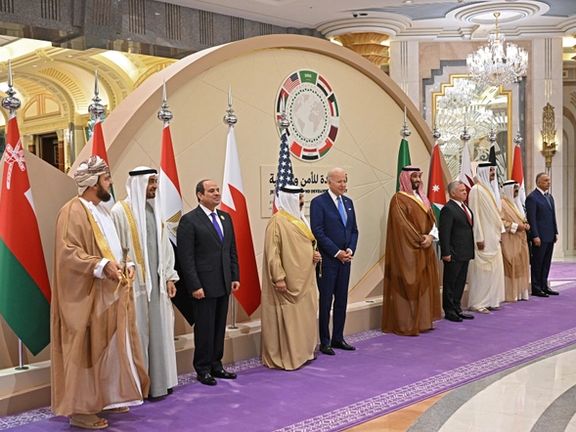
Iran has dismissed a joint statement by the United States and the Gulf Cooperation Council Arab states this week accusing Tehran of malign regional activities.
Spokesman of Iran's foreign ministry, Nasser Kanaani on Friday claimed that the statement is nothing more than a US attempt “to sow discord among regional countries.”
The US and the GCC held a meeting of the Working Group on Iran this week during the visit of an American delegation to Saudi Arabia and issued the joint statement on Thursday, February 16.
“The United States and GCC member states condemned Iran’s continued destabilizing policies, including its support for terrorism and the use of advanced missiles, cyber weapons, and Unmanned Aircraft Systems (UAS) and their proliferation in the region and around the world,” the statement said.
Iran’s Tasnim news website affiliated with the Revolutionary Guard quoted Kanaani who dismissed the joint statement as “repetitive and boring.” He went on to accuse Washington of selling billions of dollars of arms to regional countries and “continuing to support Takfiri terrorism.” Tehran has long been accusing Washington of having created and nurtured extremist Sunni terror groups, such as Al Qaeda.
The Islamic Republic finds itself under tremendous economic and political pressure since September when long-running nuclear talks with the West hit a deadlock, and at the same time nationwide popular protests erupted against the regime.
A third factor contributing to Tehran’s isolation is its supply of killer drones to Russia that have been used against Ukraine’s infrastructure. That has had a major impact on Europe’s attitude toward Iran, leading to sanctions and a discussion of listing the Revolutionary Guard as a terrorist organization.
The Iranian currency has fallen by more than 50 percent in the past six months, fueling more inflation amid strong public dissatisfaction and recurring protests.
Opponents of the regime came out into the streets again on Thursday in many cities, chanting slogans against Supreme Leader Ali Khamenei and the clerical government.
The US and the Persian Gulf Arab states voiced concern over Iran’s weapons proliferation after their meeting. “Iran and its proxies and partners have used these Iranian weapons in attacks striking civilians, critical infrastructure, and international maritime shipping.”
But the statement also expressed deep concern over Iran’s expanding nuclear program. “The United States and GCC member states further underlined that Iran’s nuclear advances as documented by the IAEA, chief among them the production of highly enriched uranium (HEU), have no credible civilian purpose and are gravely exacerbating regional and global tensions.”
Since September, the Biden administration has changed its tone toward the nuclear talks, repeatedly saying that it is no longer focused on reviving the 2015 accord, the JCPOA. Now, both the United States and its European allies have more demands than simply returning to the Obama-era deal. They are saying that Tehran should end its deadly repression against protesters, free all political prisoners, end its military role in Ukraine and its malign activities in the Middle East.
The February 16 joint statement appears to be a US recognition of the deep concerns the Gulf Cooperation Council members have long expressed about Iran’s policies and behavior, and can be a signal of non-nuclear issues becoming a prominent part of any agreement with the Islamic Republic.
“The United States and GCC member states expressed their commitment to expanding defense cooperation and interoperability to enhance their capabilities to constrain Iran’s ability to conduct destabilizing activities and deter it from conducting future acts of aggression,” the statement said.
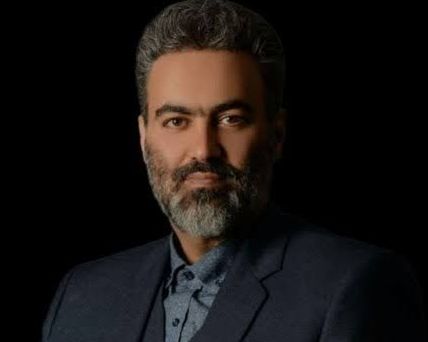
A famous Iranian religious singer – known in Iran as eulogists or maddah – has been shot dead in the northwestern city of Tabriz in East Azarbaijan province.
The body of Habil Afaq-Azar was found on Thursday with bullet wounds in one of the neighborhoods of the city. Apparently, he was killed somewhere else, and his body was dumped there.
Following the murder of Afaq-Azar, Mahmoud Hosseini, the director general of The Islamic advertisement Organization of East Azarbaijan, praised him as one best of “maddahs” of the city, who "had made numerous concert tours to Turkey and Azerbaijan."
No details about the killer(s) or the motivation of the assassination has been immediately available, but maddahs are usually affiliated with the regime and promote its propaganda in Iran and abroad.
Earlier in the month, Azerbaijan’s foreign ministry announced that 39 people were arrested in connection to an Iranian "espionage network" as part of a special operation to uncover subversive activities in the country “under the guise of religion”.
Under Supreme Leader Ali Khamenei, maddahs who used to sing tragic songs in graveyards for families of the deceased or chant tragic stories during the mourning month of Muharram to earn a living, are now the Islamic Republic’s political theoreticians, influential figures in political groups and government offices. They can put anybody’s business on fast track, albeit against a fee, using their influence as individuals close to Khamenei.